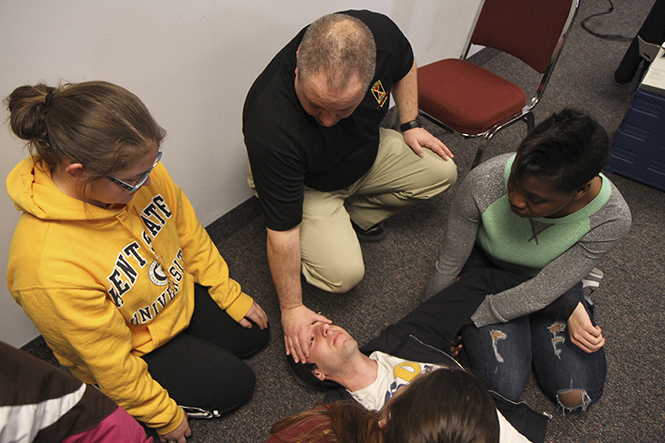ALICE training mandatory for freshmEn
Lt. Joe Hendry of the KSUPD demonstrates to students how to detain a gunman during the A.L.i.C.E. training workshop on March 15, 2013 in the student center. A.L.I.C.E., which stands for Alert, Lockdown, Information, Counter and Evacuation, is a crisis training program teaching students how to deal with an active shooter situation. Photo by Shane Flanigan.
Kent State continues to show confidence in being an Alert, Lockdown, Inform, Counter and Evacuate (ALICE) trained school in light of the recent shooting on Oct. 1 at Umpqua Community College in Oregon.
The devastating aftermath included 10 people killed and nine others injured, confirming it to be the deadliest shooting in history for Oregon.
One day after the shooting in Umpqua, Lt. Joe Hendry, a national ALICE instructor and officer at Kent State Police Department, taught a scheduled ALICE class to more than 200 students on campus.
“I touched on it, that it happened obviously, but I didn’t teach the class any differently than I normally do,” Hendry said. “I’m a big believer in the fact that when you train people you shouldn’t scare them.”
ALICE, as of 2014, became a mandatory program for all incoming freshman to go through when they arrive for Destination Kent State (DKS) sessions in the summer. Although primarily for new students, staff and faculty are encouraged to go through the training as well.
The proactive safety program has been around for 14 years, having been developed by husband and wife, Greg and Lisa Crane, after the basic lockdown tactics concept failed at Columbine in 1999, Hendry said.
“ALICE is what we call an enhanced lockdown, you have more options than just one thing depending on what’s going on at the time,” said Tricia Knoles, a KSUPD community resource officer. “There is no bad decision as long as you’re doing something.”
According to Hendry, Umpqua Community College is a lockdown school, meaning they weren’t trained in taking proactive measures, such as those taught through ALICE.
“There were some interviews with students that were in rooms by that room (of the active shooter) that said they didn’t know what to do,” Hendry said. “They just turned off the lights and hid under their desks and they weren’t even sure what that was doing.”
ALICE training pertains to the mental preparation needed within threatening situations.
“It makes you say, ‘what are my options, can I barricade the door, is it safe for me to evacuate or is this something where I’m confronted with this shooter in my face right next to me,’” said KSUPD’s Sgt. Michquel Penn.
Penn said any time you have some training like this, it gets you to think about using something and increases your confidence. Ultimately, it is going to make a difference.
“I think it’s important to have ALICE training on campus. If we didn’t have the knowledge that ALICE training gives us, then there would be more incidents like Oregon,” said Madeleine Knebusch, a sophomore nutrition major. “If I didn’t go through ALICE training then I wouldn’t know that to do if I was in a situation on campus.”
Hendry said there are three responses during an active shooter incident, not one. Countermeasures are for people directly in contact.
Evacuation of the facility is the primary response rather than lockdown, which is still a part of ALICE, and involves barricading and preparing countermeasures.
Kent State would not have brought the program to campus if it weren’t something that worked, Hendry said. ALICE has been instructed at KSU for about six and a half years now.
“We studied different response companies, plans and school security experts,” Hendry said. “We were looking for something to do here for all of us 40-some thousand students, plus staff, 110 buildings and all of the regional campuses.”
According to ABC News, as of 2012, more than 300 schools have implemented ALICE training.
“We’re definitely not a university that, just because somebody else is doing something thAT we’re going to get on the bandwagon, but we are always looking out for safety on campus that would be useful to our students,” Penn said.
To register for a free ALICE workshop on campus go to, https://www.kent.edu/success/alice-workshops
Dana Miller is the safety and transportation reporter for The Kent Stater. Contact her at [email protected].



